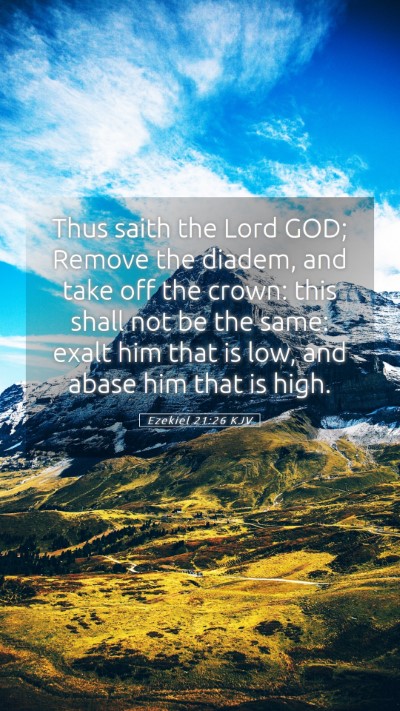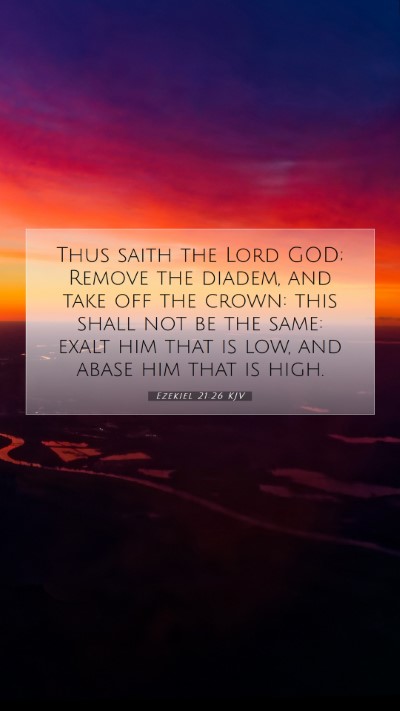Bible Verse Meaning of Ezekiel 21:26
Ezekiel 21:26 states, "Thus saith the Lord God; Remove the diadem, and take off the crown: this shall not be the same: exalt him that is low, and abase him that is high." This verse comes amidst God's judgment, where He announces significant changes in the leadership and political structures of Israel.
Understanding the Context
This passage is a part of a prophetic declaration by Ezekiel in which God reveals the coming destruction and upheaval that will befall Judah and Jerusalem due to their sins. The removal of the diadem and crown symbolizes a transition of power and authority, emphasizing the sovereignty of God in determining the fate of nations.
Insights from Public Domain Commentaries
-
Matthew Henry:
Henry interprets the removal of the crown as a divine act of reordering. He suggests that God is saying that the former dignities and hierarchies will no longer hold their significance in His eyes. This reflects the principle that God has the authority to elevate the humble and bring down the proud.
-
Albert Barnes:
Barnes views this action as a part of God's judgment, indicating that the leaders in Jerusalem will lose their power. In destabilizing the current order, God prepares the way for a new regime that aligns more closely with His divine justice and purposes.
-
Adam Clarke:
Clarke notes that this was a foreshadowing of the change that would come with lack of righteous leadership. The emphasis on "exalt him that is low" implies a moral and spiritual upheaval where the unjust strength will be brought low, reflecting God's ultimate plan for restoration.
Key Themes and Significant Points
This verse encapsulates the themes of:
- Divine Sovereignty: God's ability to change the fate of nations demonstrates His ultimate authority over all creation.
- Justice and Restoration: The removal of the crown indicates that divine judgment is paired with the promise of restoring a humble and righteous leadership.
- Human Pride vs. Divine Will: The juxtaposition of high and low serves as a reminder that human pride does not endure before the majesty of God.
Applying Ezekiel 21:26 to Daily Life
For readers seeking to apply this verse, it invites reflection on:
- How power dynamics play out in various aspects of life, from personal relationships to politics.
- The importance of humility and the understanding that worldly success is fleeting.
- Recognizing areas in which God might be calling for a change in leadership or direction in one's own life.
Cross References
This verse can be cross-referenced with:
- Proverbs 3:34: "Surely He scorns the scornful, but gives grace to the humble."
- Isaiah 40:4: "Every valley shall be exalted, and every mountain and hill brought low..."
- James 4:10: "Humble yourselves in the sight of the Lord, and He will lift you up."
Conclusion
Ezekiel 21:26 serves as a profound reminder of God's control over the ebb and flow of power and authority. Through this verse, we gain Bible verse interpretations that emphasize the importance of humility, the justice of God, and the ultimate restoration He brings. As we study Scripture, let us embrace these insights to deepen our understanding of God's word.


